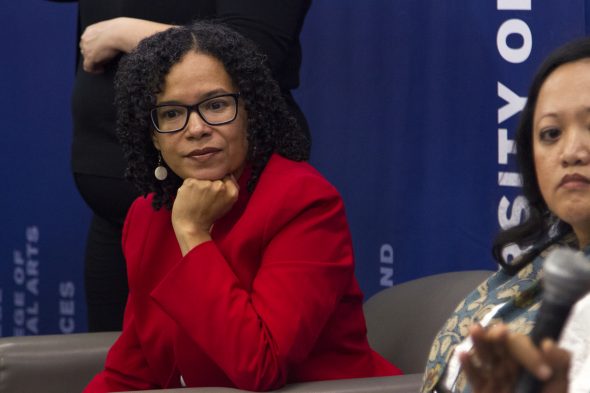Why definitions of race and ethnicity matter in the 2020 census

Nancy López, (Left) associate professor of sociology at the University of New Mexico presents, “Who Gets Counted and Why: Race, Ethnicity and Latinx in the 2020 Census” as part of the Campus Conversation series. (Photo: Carley Mostar)
How people identify themselves and how government identifies them through census figures have far-reaching repercussions on how people are treated and perceived, according to an expert who spoke to a packed room in the latest Campus Conversation at UIC.
In the Oct. 12 gathering at the Student Center East building, Nancy López, associate professor of sociology at the University of New Mexico presented the lecture, “Who Gets Counted and Why: Race, Ethnicity and Latinx in the 2020 Census.”
Joining her was a panel of UIC professors moderated by Provost and Vice Chancellor for Academic Affairs Susan Poser.
A standing room only audience listened as López discussed a project involving a content analysis of official documents of the Office of Management and Budget (OMB) and the U.S. Census which both serve as sites of racial formation.
López called for U.S. Census officials to adjust how it tallies Hispanics, based not solely on their shared cultural identification but also on their racial origins, often how others see them. She said this population data collected by the government has far-reaching civil rights, social and economic implications.
“It relates to representation in Congress, it relates to the allocation of resources,” said López.
She pointed to examples of when people are interacting with people in power, such as immigration or law enforcement officials, or even searching for housing.
Pointing to studies, she said property owners might not bar a person with a Hispanic name from seeing a property. What gets in the way, according to López, is whether the potential tenants are dark skin or are of African descent compared to lighter skin Hispanics who will have a greater advantage. The property owner can show they are complying with civil rights issues by saying they are renting to Hispanics.
“Race is multi-level, it’s not just a matter of individual identity,” said López. “Whether we’re Latin American or Caribbean, we find evidence for these racialized disparities within our communities. This is not going to help our communities, [this] color blindness or ignoring the reality that Hispanics in the same national origin can be of any race.”
The panel included Amalia Pallares professor of Political Science and Latin American and Latino Studies and director of the Latin American and Latino Studies Program; Nadine Naber, associate professor of Gender and Women’s Studies and Asian American Studies and director of the Arab American Cultural Center at UIC; and Anna Guevarra, associate professor and founding director of Global Asian Studies.
López’s research and teaching is guided by the importance of examining race, gender, class, and ethnicity to investigate inequalities across various social outcomes including, education, health, employment and housing to develop solutions to advance social justice.
“How you are racialized, what racial meanings are assigned to you and what gender meanings are assigned to you are usually the two positions in society that over power all others,” said López. “None of us created systems of inequality when we were born…however, we are all located in these systems of inequality.”
